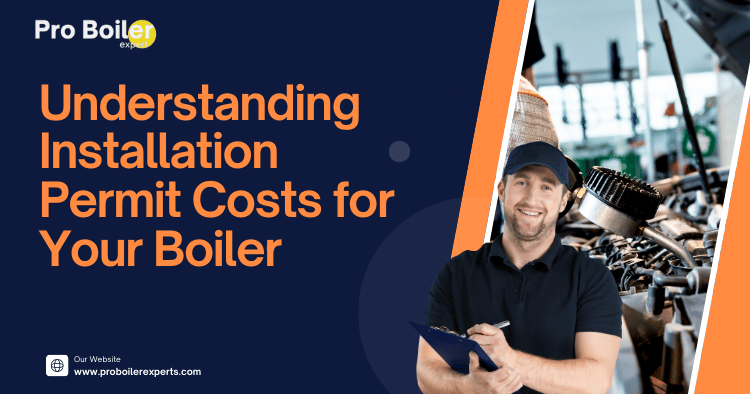Table of Contents
- What is an Installation Permit?
- Why Do You Need a Permit for Boiler Installation?
- Factors Influencing Installation Permit Costs
- Average Costs of Boiler Installation Permits
- How to Obtain an Installation Permit
- Frequently Asked Questions (FAQs)
What is an Installation Permit?
An installation permit is an official approval that grants you permission to carry out specific types of work, such as installing a boiler in your home. These permits are typically issued by local government authorities or building departments to ensure that installations meet safety and building codes. The permit process helps protect homeowners by ensuring that installations are done properly and safely.
“Obtaining an installation permit is not just a formality; it’s essential for ensuring your safety and compliance with local regulations.”
Why Do You Need a Permit for Boiler Installation?
Getting a permit for your boiler installation is essential for several reasons:
- Safety Compliance: Permits ensure that installations meet local building codes and safety standards, reducing the risk of accidents or failures.
- Insurance Protection: In the event of a mishap, having a permit can be crucial for insurance claims. It proves that the work was done legally and up to code.
- Resale Value: If you decide to sell your home, having proper documentation, including installation permits, can enhance your property’s value and simplify the sale process.
- Legal Requirements: Many jurisdictions mandate permits for boiler installations to ensure compliance with local laws.
“Consider the permit as your safety net—it not only protects you but also your investment in your property.”
For more detailed information on the importance of permits, you may find insights in articles about boiler installation processes and boiler installation costs.
Factors Influencing Installation Permit Costs
The cost of obtaining a permit can vary based on several factors:
| Factor | Description |
|---|---|
| Location | Permit costs can differ significantly between cities and counties. Urban areas typically have higher fees. |
| Type of Boiler | Different types of boilers (e.g., gas, oil, electric) may have varying permit requirements and costs. |
| Complexity of Installation | More complex installations that require additional inspections may cost more. |
| Additional Requirements | Some areas may require extra documentation or inspections, contributing to higher costs. |
| Processing Fees | Administrative costs associated with processing your application can vary by jurisdiction. |
“Being aware of these factors can empower you to plan your budget effectively and avoid surprises.”
Understanding these factors can help you anticipate the costs involved in obtaining your installation permit.
Average Costs of Boiler Installation Permits
While the cost of installation permits can vary widely, here are some average ranges to help you budget:
- Basic Permit Costs: $50 to $200
- Additional Inspection Fees: $50 to $150 (if required)
- Complex Installations: $200 to $500 (or more depending on local regulations)
Always check with your local building department for the most accurate pricing. Websites like HomeAdvisor or Angie’s List can also provide insights into average costs in your area.
“Investing in the right information can save you money in the long run—don’t skip the research!”
How to Obtain an Installation Permit
The process of obtaining a boiler installation permit typically involves the following steps:
- Research Local Requirements: Start by visiting your local government’s website or contacting the building department to understand the specific requirements for your area.
- Gather Necessary Documentation: Commonly required documents include:
- Detailed drawings of the installation
- Specifications of the boiler
- Proof of ownership or rental agreement
- Submit Your Application: Fill out the permit application form and submit it along with the required documentation and fees. Ensure that all information is accurate to avoid processing delays.
- Schedule Inspections (if needed): In some cases, you may need to schedule an inspection before or after the installation. Make sure to comply with all inspection requirements.
- Receive Your Permit: Once your application is approved, you will receive your installation permit. Display it prominently during the installation.
“Following these steps diligently can streamline the process and lead to a quicker approval.”
Frequently Asked Questions (FAQs)
- Do I always need a permit for boiler installation?
Yes, most jurisdictions require a permit for boiler installations to ensure compliance with safety codes.
- What happens if I install a boiler without a permit?
Installing a boiler without a permit can lead to fines, complications with insurance claims, and difficulties when selling your home.
- How long does it take to obtain an installation permit?
The timeline can vary, but it typically takes anywhere from a few days to a few weeks, depending on the complexity of your application and the workload of your local authority.
- Can I apply for a permit online?
Many local governments offer online applications for installation permits. Check your local building department’s website for more information.
- Are there any exemptions for permits?
Some minor repairs or installations may not require a permit. It’s best to consult with your local authority to clarify any exemptions.
“It’s always better to ask questions upfront rather than face issues later—clarity is key.”
By understanding installation permit costs and the associated processes, you can ensure a smooth, compliant, and safe boiler installation in your home. Don’t hesitate to reach out to local authorities or professionals for guidance, and always prioritize safety and legality in your home improvement projects!
For further reading on boiler types and their features, refer to our articles on the benefits of different boiler types and installation considerations.





